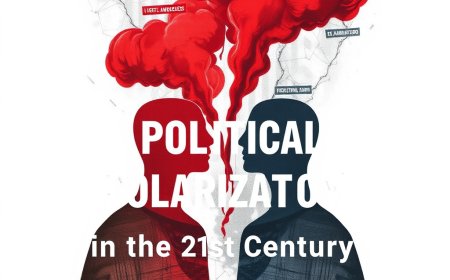Understanding Political Ideologies and Their Origins
Political ideologies have been a cornerstone of human society, shaping the way we govern ourselves, interact with one another, and understand the world around us. From the earliest forms of governance to the complex systems of modern times, ideologies have played a crucial role in defining the principles, values, and practices that underpin our societies. In this article, we will delve into the world of political ideologies, examining their origins, evolution, and the various forms they take today.
The term 'ideology' was first coined by the French philosopher Destutt de Tracy in the late 18th century, referring to the science of ideas. Over time, the concept has evolved to encompass a broad range of beliefs, values, and principles that shape our understanding of politics, society, and the economy. At its core, a political ideology is a comprehensive and coherent system of ideas that provides a framework for understanding and interpreting the world. It offers a vision of how society should be organized, how power should be distributed, and how resources should be allocated.
One of the earliest and most influential political ideologies is liberalism. Emerging in the 17th and 18th centuries, liberalism emphasized the importance of individual rights, freedoms, and the protection of private property. Thinkers such as John Locke and Adam Smith argued that individuals should be free to pursue their own interests, and that the role of government should be limited to protecting the rights and liberties of citizens. The influence of liberalism can be seen in the development of modern democracies, where the protection of individual rights and the promotion of free markets have become cornerstone principles.
In contrast to liberalism, conservatism emerged as a response to the rapid social and economic changes brought about by the Enlightenment and the Industrial Revolution. Conservative thinkers such as Edmund Burke argued that tradition, order, and authority were essential to maintaining social stability and continuity. They emphasized the importance of preserving established institutions and practices, and were skeptical of radical change or innovation. Conservatism has taken many forms over the years, from the traditionalism of Burke to the more modern variants that emphasize the importance of national identity and cultural heritage.
Socialism, another major political ideology, emerged in the 19th century as a response to the social and economic inequalities generated by capitalism. Socialist thinkers such as Karl Marx and Friedrich Engels argued that the exploitation of the working class by the capitalist class was a fundamental feature of capitalist societies. They advocated for the abolition of private property, the establishment of a classless society, and the redistribution of wealth and power. Socialism has taken many forms, from the revolutionary socialism of Marx and Engels to the more moderate social democracy that has become a dominant force in many European countries.
In addition to these major ideologies, there are many other variants and hybrids that have emerged over the years. For example, fascism, which emerged in the early 20th century, emphasized the importance of national identity, authoritarianism, and the suppression of individual rights and freedoms. Environmentalism, a more recent ideology, emphasizes the need to protect the natural world and promote sustainable development. These ideologies, and many others, reflect the diverse and complex nature of human societies, and highlight the ongoing struggle to define the principles and values that shape our world.
The origins of political ideologies are complex and multifaceted, reflecting the diverse influences of history, culture, and economics. They are shaped by the interactions of individuals, groups, and institutions, and are often the product of conflict, negotiation, and compromise. Understanding the origins and evolution of political ideologies is essential for making sense of the complex and often contradictory nature of modern politics. By examining the historical and cultural contexts in which ideologies emerge and evolve, we can gain a deeper understanding of the values, principles, and practices that shape our societies.
In conclusion, political ideologies are a fundamental aspect of human society, shaping the way we understand and interact with the world around us. From the earliest forms of governance to the complex systems of modern times, ideologies have played a crucial role in defining the principles, values, and practices that underpin our societies. By examining the origins, evolution, and various forms of political ideologies, we can gain a deeper understanding of the complex and often contradictory nature of modern politics, and develop a more nuanced appreciation of the diverse and complex nature of human societies.
As we move forward in an increasingly complex and interconnected world, understanding political ideologies and their origins will be more important than ever. By examining the historical and cultural contexts in which ideologies emerge and evolve, we can gain a deeper understanding of the values, principles, and practices that shape our societies, and develop a more informed and nuanced appreciation of the complex and often contradictory nature of modern politics.
The study of political ideologies is not just an academic exercise; it has real-world implications for how we govern ourselves, interact with one another, and understand the world around us. As such, it is essential that we continue to explore and understand the complex and multifaceted nature of political ideologies, and their ongoing role in shaping our societies and our world.
Furthermore, the understanding of political ideologies can also help us to better navigate the complexities of modern politics, and to make more informed decisions about the issues that shape our world. By examining the underlying values, principles, and practices that shape different ideologies, we can gain a deeper understanding of the trade-offs and compromises that are involved in political decision-making, and develop a more nuanced appreciation of the complex and often contradictory nature of modern politics.
In the end, the study of political ideologies is a rich and complex field that offers insights into the human condition, and the diverse and complex nature of human societies. By continuing to explore and understand the origins, evolution, and various forms of political ideologies, we can gain a deeper understanding of the values, principles, and practices that shape our world, and develop a more informed and nuanced appreciation of the complex and often contradictory nature of modern politics.
















